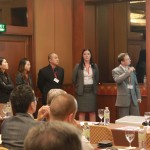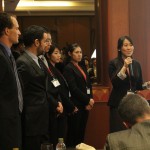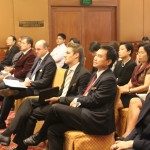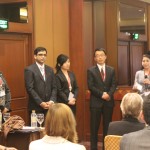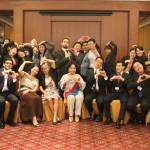by MiYoung & Eddie
- Time to start the show begin!
- Group 1
- Group 2
- Group 3
- From the Sukosol
- Group 4
- The Sukosol & MMH 2012
- Happy Ending!
After reuniting with classmates on the 1st day, hotel visits, presentations of Siam City (which will be renamed “The Sukosol”), and an alumni reception dinner and on the 2nd day, it was down to business on day 3!!
Forming groups of 5 or 6, the class was to present group analyses on the repositioning of the Siam City Hotel in the current market environment. Although the economic downturn in 2008 affected all Bangkok hotels, Siam City was hit particularly hard, sustaining only a 58% occupancy in December of that year. Traditionally, Siam City had not been a strong performer versus its competitors and it was our job to help find solutions to the problem.
The Marisa’s presentation of the hotel not only was great in giving us a better picture of the Sukosol family’s brands, portfolio, and ownership objectives, but also meant additional work was required to tailor our presentation to include the new information. As such, many, if not all!, groups stayed up into the early morning hours before the presentation to refine or create their presentations.
Many more people than expected attended the presentation, numbering 40+ across all departments from the 4 of their properties, The Bayshore, Siam Bayshore, The Sukosol, and their upcoming, crown-jewel project, The Siam.
You could see the tension increase among the groups as the staff were eager to take notes and looked to us for advice and a critique of their hotel and performance.
As the presentations got underway, the audience quickly saw that different groups used different approaches to investigate the issues and suggest options. The focus of each group included:
• Cultivating operations to appeal to the patrons’ “Five Senses”
• Feasibility analysis of constructing service apartments
• Tactical approach in operations and marketing focus: service processes, use of newsletters, flash sales, trade fairs, etc.; areas of focus on the physical property, maintenance of Thai charm which makes property unique
• Marketing approaches and the use of more popular, bloggers who are widely followed and leveraging of the sukosol name and family in entertainment to partner with HSBC to do a commercial
• Loyal programs, marketing deliver hotel in unified voice, tools to measure advertisements, website visits, and general traffic.
Presentation was recorded and we were featured in hotelsresources.com. Kamala, the owner of the property, graciously spoke about the way she came to own the hotel, the trials and tribulations in working in different industries (automobiles to hotels), and being involved in an entertainment family. While the longer presentations meant that we missed the temple tour, us MMHers were relieved to past this large hurdle and truly start partying in Bangkok!


